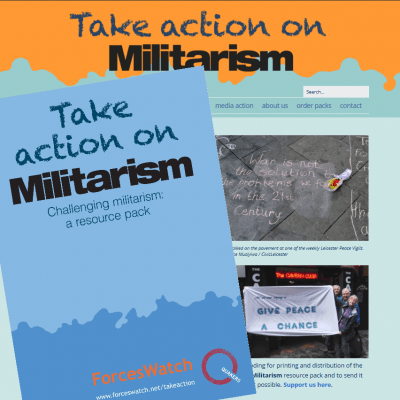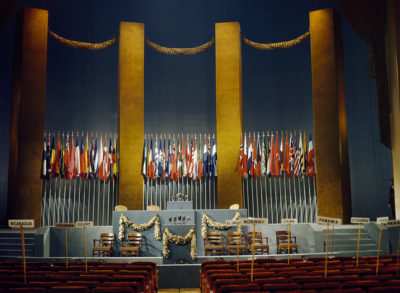Take Action on Militarism 2017 pack launch
ForcesWatch comment
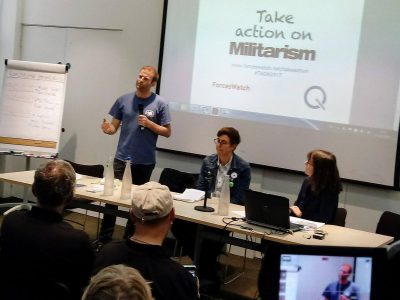
‘We’re really lucky to be in a movement, and it is a movement, trying to do something about militarism,’ says Sam Walton of Quakers in Britain. Sam Walton of Quakers in Britain was speaking at the Take Action on Militarism launch on 21 October 2017.
Just a few days later Sam was exonerated for attempting to disarm a British warplane heading to arm the Saudi-led war on Yemen.
#TAOM2017 launched the Take Action on Militarism pack which is designed to equip and support this movement. See here to download or order hard copies.
The pack contains background information, key facts, case studies and tips for action on militarism. It has been produced by ForcesWatch and Quaker Peace and Social Witness. We are distributing copies for free, and we are raising money to help us do so on our crowdfunder page.
At the launch, we heard from 16 year old Scotland Against Militarism founder Jay Sutherland; Penny Walker and Ambrose Musiyiwa from Leicester for Peace; and Bernie Draper from the Merseyside Peace Network. They shared with us their personal stories, anecdotes, thoughts and advice from their local action on militarism: from instigating dialogue about militarised police forces, to flying the Pride/peace flag while protesting Armed Forces Day, to chalking messages for peace on the city centre pavement, to working with artists and engaging with alternative media sources.
Academic and Peace Pledge Union council member Hilary Cornish discussed how the term militarism, like feminism, enables us to see the wider system we are trying to resist, how actions that may be perceived as small and everyday are powerful and important, and how feminism and action on militarism are intimately interconnected.
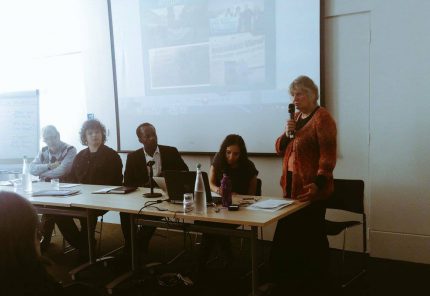
Coordinator of Veterans for Peace UK Ben Griffin, shared his ‘four pillars’ of a fully militarist state and discussed to what extent the UK has these pillars – the ability to exert military force, the intent to use it, consent from the majority to impose your will on other states using military force, and control of the military over the state. He also emphasised how important it is to think about how you are tackling these pillars – do you want to resist militarism, or perhaps undermine militarism?
Social media trainer Chris Henderson ran a fun and information session on the power of social media and how to use it effectively to campaign, and Andrew Smith, Director of media at Campaign Against Arms Trade, led a workshop on how to enter the coveted space of national press. Inspired by training we received earlier this year from renowned refugee rights campaigner Frank Sharry, organised by the Rethinking Security Group, the ForcesWatch team ran a workshop on developing a communications-centred campaign strategy using the narrative house technique.
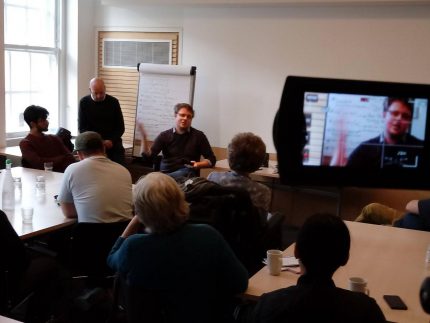
Pax Christi and the Peace Pledge Union were there running stalls and giving lunchtime presentations on their work, along with Mic Dixon, who is producing a documentary film called War School on the militarisation and recruitment of young people. The packed room at Friends House was full of people keen to take action on militarism; journalists, academics, activists and members of peace and faith groups, veterans and more – all gathered to share, support and mobilise together.
Several messages were repeated throughout the day, from participants to speakers:
1. It’s always worth doing something. Even small actions like wearing a white poppy or commenting on an online article, are significant.
2. Local campaigners should share and connect with national organisations so they can be supported, and national organisations should attend and support local events and actions when they can.
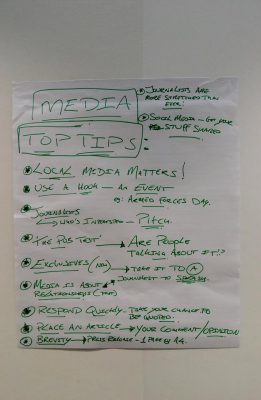
3. Hone and develop your key message, think about how to communicate to your audience and build your campaign around your message. Be able to reference research but give your messages an emotional hook.
4. Use social media and alternative media sources, and write to local and national press.
5. Taking action on militarism is emotionally difficult. Support each other, lift each other up and be proud of the great work you are doing. Do you have other Take Action on Militarism (#TAOM) top tips, or thoughts from the launch, pack or website? Share them on Twitter with @ForcesWatch #TAOM2017
And lastly, here are some funny, poignant and motivating key #TAOM2017 quotes and tweets from the day.
‘What enables the war system to operate and flourish is the way military ideals and thinking can permeate our everyday life.’ Hilary Cornish, Peace Pledge Union
‘Over 1000 years we’ve attacked every country in the world bar 22. If you’re a militarist, that’s a pretty good record – there’s not many countries we haven’t invaded! Bolivia? Really hard to get to. The Vatican, Monaco – are they really countries?’ Ben Griffin, Veterans for Peace UK
‘It doesn’t matter how small your group is just now, or how small what you’re organising is, everything can expand into bigger things.’ Jay Sutherland, Scotland Against Militarism
‘It’s emotionally hard to stand up to the Army and we can’t forget that, it’s a difficult thing to do.’ Penny Walker, Leicester for Peace
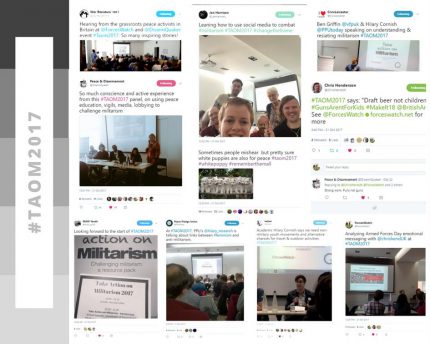
‘The Army do not like being questioned, and we may have had far more effect than we think.’ Penny Walker, Leicester for Peace
‘We are concerned by how the Army especially is selling supporting military activity, military action, recruitment – it is selling it as “belonging”. Now, in the environment we are in, that is quite disturbing – because on the one hand we have a certain message from politicians, mainstream media, that is framing people that are not British as not belonging, and then at the same time as it is doing that it is telling the same people that actually you belong if you are part of the Army. You can choose your choice expletive!’ Ambrose Musiyiwa, Civic Leicester
‘The other concern that I have around the militarisation of public spaces is that they create tensions between communities such as Leicester, and the people who are supposed to be policing them. The tensions are visible because while Leicester is one of the most ethnically diverse cities in Britain if not the world, on the other hand the people who are policing it, especially – particularly the armed police officers, are mainly all white men.’ Ambrose Musiyiwa, Civic Leicester
‘We challenge and counterbalance the culture of militarism in a non-aggressive way, because we need to be the peace we want to see, as Gandhi said.’ Bernie Draper, Merseyside Peace Network
‘Let’s make recruitment 18 in line with international standards – it’s not a radical step. It’s fair, it’s just – it just makes sense.’ Douglas Beattie, ForcesWatch
‘Militarism is gendered, and gender is militarised’. Hilary Cornish, Peace Pledge Union
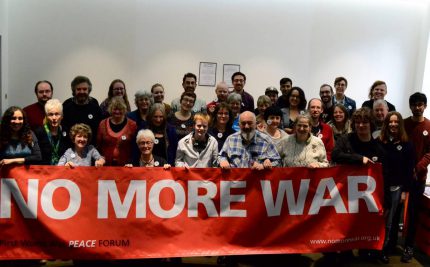
Images taken by Ambrose Musiyiwa/Civic Leicester and from the #TAOM2017 twitter feed
See more: military in schools/colleges, military in society, recruitment, remembrance, ForcesWatch, Quakers, militarisation
Like what you read?
> Sign up for our newsletter or blog notifications
> Support our work – from just £2 a month

